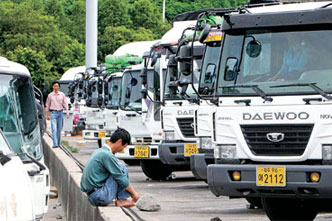 영어토론방 영어토론방 | Home>영어토론방 |
Economy The Third Oil Shock
페이지 정보

본문
 Third Oil Shock
Third Oil Shock Contingency Plan Should Start Not Later but Now
Korea is now mired in a seemingly endless beef brawl, but the rest of the world is wrestling with skyrocketing oil prices. So it is only natural ― if quite belated ― for the government to come up with a contingency conservation program. Its contents and underlying assumptions show, however, that Seoul still doesn't seem to be fully aware of the dire situation facing this country.
The two-stage, four-scenario plan calls for introducing various compulsory energy-saving steps in the public and private sectors, ``if and when" the prices of Dubai crude, which have already topped $140 a barrel, reach $150 and then $170, respectively. Even a quick glance reveals the problems of this program, however; it is preoccupied with only short-term belt-tightening by consumers and appears to insinuate the nation may as well do nothing until the crude prices go up higher.
No one can deny the need for a drastic conservation drive. Just look at the capital city, which never seems to sleep with so many all-night bars and saunas and its streets filled with numerous driver-only cars during rush hours. As if these were not enough, heads of local administrations are moving to change their official vehicles from midsize to large models.
All this is happening in a country, which is the world's fifth largest importer and consumer of energy per person and spends one tenth of its gross domestic product on oil imports. Americans who complain about $4-a-gallon gas price should not talk to Koreans, who spend $16 for a gallon of gasoline and diesel, considering the gaps in fuel prices and per capita income between the two countries.
So, the energy-saving plan should go into effect now, not later. The government should have timed its first-phase implementation to an oil import price of $130 instead of $150. That the officials are forecasting the average import price at $120-a-barrel is another reminder of their complacency, raising a question over whether they really intended to put this plan into effect when formulating it.
Global oil experts share the view that the era of cheap oil has gone for good to be replaced by a ``peak oil'' era, when dwindling oil reserves no longer permit annual increases in production. They agree despite some room for price bubbles made by speculators, the long-term trend for world oil prices is nowhere but upward. Korea can no longer survive these times of expensive energy with makeshift, conservation steps but work out a comprehensive structural change in the long run.
Development of various renewable energy sources is a matter of course, and the nation also needs to come up with ways to ``retrieve'' vast oil dollars, including part of its own payment, in the Middle East by riding on the revived building boom there.
The whole nation should be prepared for a whole new energy-minded living. As always, it must be the government and public sector that should set some examples by downsizing official vehicles, using bicycles in commuting and levying hefty charges on cars moving into city centers during the daytime.
Whether we Koreans are aware of it or not, the third oil shock is already beside us, forcing us to learn how to live with it.
- Korea Times
Question
1.Have you imagined the life without cars? How is it?
2.Can you realize terrible soaring of oil price?
3.What do you think of the bubble?
4.Do you have a special idea about oil shock?
이 글은「대학연합영어토론동아리」www.pioneerclub.com에서 제공하는 영어토론 정보입니다.
댓글목록

PaulyWolly님의 댓글
PaulyWolly 작성일Can George BUsh be held responsible for this?

여러분사랑합니다님의 댓글
여러분사랑합니다 작성일와우~ 너무길어서 해석하기가 힘들어요

